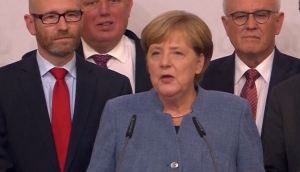nsnbc : Chancellor Angela Merkel and her CDU/CSU coalition won a fourth term but lost several percent. The Social Democrats (SPD) keep their position as second-largest party despite a historic loss. The SDP won’t join a new grand coalition with Merkel and the CDU/CSU. The Liberals Democratic Union (FDP) returned to parliament. Also represented in the new parliament are the Alternative for Germany (AfD), the Left (Die Linke), and the Union 90 / The Green Party.
Preliminary official results show, Monday morning, that the Christian Democratic Union / Christian Social Union (CDU/CSU) and Chancellor Angela Merkel won 33,0% of the votes. Merkel and the CDU/CSU won but lost more than 8%. The Social Democratic Party (SPD) received 20,9% of the votes, lost about 5% and suffered a historic defeat. The third-largest party in the new German parliament is the national populist Alternative for Germany (AfD) with 12,6% of the votes. The AfD gained about 8% and is thus one of the winners of the 2017 elections. The Liberal Democrats (FDP) won 10,7%, about 5% more than during the previous elections, and returned to parliament. The Left (Die Linke) won 9,2% and the Union 90/ The Green Party won 8,9%. The results are preliminary official results as of Monday morning but any eventual changes will not affect the overall result.
Chancellor Angela Merkel will be tasked with forming a new government and has several options. One – unlikely but possible – option would be to form a CDU/CSU minority government that would have to rely on ad hoc cooperation with the other parties to pass legislation on a case to case basis. Another option would be to continue the CDU/CSU – SPD government a.k.a. “The Grand Coalition”. However, the SPD has already signalled that it won’t join a new grand coalition. Another – traditional – option would be a CDU/CSU – SPD – FDP coalition. Another option would be for the CDU/CSU to form a coalition with the AfD and the Liberal (FDP) even though this is about as unlikely as a coalition with the CDU/CSU and The Left.
One thing is certain, Merkel and the CDU/CSU announced Sunday night that the “Union” still is the most powerful party and that Merkel and the CDU/CSU will form a government regardless of the relatively significant losses. The CDU/CSU is despite its losses so strong that it is virtually impossible to form a coalition government against it. Theoretically that SPD, The Left, and the Green Party could form a coalition – one that would stand even stronger if the AfD would substitute The Left of The Green Party – theoretically, but.
Sunday evening, as the polling stations were closing, SPD chief Martin Schulz and SPD parliamentary group leader Thomas Oppermann announced that the SPD would go into the opposition. Schulz called for turning the SPD into a “Bulwark for Democracy” because “one must surrender the opposition leadership to the Alternaive for Germany (AFD).”
Ironically, the SPD, CDU/CSU and others would describe the AfD as “populist” despite that fact that both the CSU/CSU and the SPD have used populism galore in an attempt to steal the wind out of the AfD’s sails. The Merkel government’s U-turn with regard to refugees and migrants was a clear response to AfD policies. With regard to the SDP it’s worth noting that choosing Sigmar Gabriel- who previously dared to touch upon the taboo issue of German sovereignty – may have convinces some German patriots, for some limited time, to believe the SPD would address the issue. The fact that Gabriel “shut up like an oyster” after he was appointed merely convinced many German patriots (frequently denounced as Nazis, Fascists, Racists, and if that doesn’t help as anti-Semites) that the AFD really “is” an, if not “the Alternative for Germany”.
SPD’s Sigmar Gabriel before his appointment as Foreign Minister “We don’t have any government in Germany. Ms. Merkel is the CEO of a Non Governmental Organization in Germany”. Arguably a true statement but populist lip service alone won’t secure the votes of a growing number of German patriots who are dissatisfied with the de-facto lack of German sovereignty.
It’s safe to say that the outcome of the 2017 elections – regardless which government Merkel and the CDU/CSU construct – has already made the potential in German domestic and foreign politics more interesting than it has been for a long time. It will also be interesting to observe the interplay between the AfD and the FDP; The two parties may have more in common than either of them wants to admit.
CH/L – nsnbc 25.09.2017
Source Article from https://nsnbc.me/2017/09/25/cdu-and-merkel-win-german-elections-afd-and-german-patriots-the-actual-winners/
Related posts:
Views: 0
 RSS Feed
RSS Feed

















 September 25th, 2017
September 25th, 2017  Awake Goy
Awake Goy 











 Posted in
Posted in  Tags:
Tags: 
















